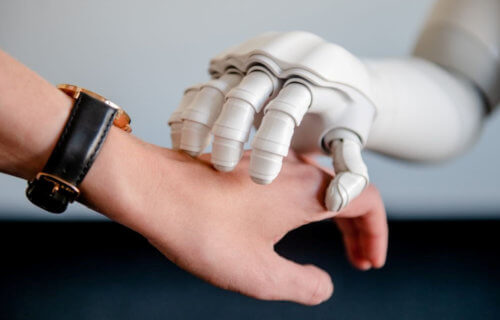BOCHUM, Germany — Does a reassuring pat on the back bring you comfort during a tough day? A new study finds, when it comes to touching, people aren’t even picky about who’s doing the touching. Researchers in Germany say the touch of a humanoid robot makes people happier and more likely to follow their requests.
Instead of being reliant on other humans, researchers are hoping that one day robots may be able to fulfill the roles of therapists, personal trainers, and even life coaches. Their study follows the widespread increase of touch starvation during the COVID-19 pandemic. Several studies have pointed out how physical distancing and isolation is creating psychological complications over the last year.
People who go a long time without touch, also called “skin hunger” or “affection deprivation,” may experience a variety of negative physiological effects that increase feelings of stress, depression, and anxiety. Some studies even find that these people may even have an increased likelihood of infections due to immune system changes.
Study authors note scientists continue to explore the effects of physical contact with robots. However, while some studies detect meaningful effects, others find no benefit to a robotic hug.
A motivational robot?
In this research, 48 students engaged in a counselling conversation with the humanoid robot NAO – a programmable research robot often used for education and research purposes. During the course of the conversation, for some participants, the robot briefly and seemingly spontaneously patted the back of the participant’s hand.
This differed from the design of other studies, which have relied on human-initiated touch. In response to the robot’s touch, most participants smiled and laughed, and none pulled away. Results show those who were touched were more likely to go along with the robot urging them to show interest in a particular academic course discussed during the conversation.
Participants also reported a better emotional state after the robot’s pat on the hand. Researchers note those who the robot did not touch still rated the conversation just as favorably.
The hope is that scientists can harness the impact on request compliance so robots can engage in motivational jobs, such as persuading someone to exercise more.
“A robot’s non-functional touch matters to humans,” Laura Hoffmann from Ruhr University and her team write in a media release. “Slightly tapping human participants’ hands during a conversation resulted in better feelings and more compliance to the request of a humanoid robot.”
The findings were published in the journal PLOS One.
SWNS writer Joe Morgan contributed to this report.
